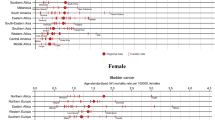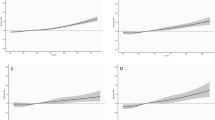Abstract
An association between coffee consumption and cancer has long been investigated. Coffee consumption among Norwegian women is high, thus this is a favorable population in which to study the impact of coffee on cancer incidence. Information on coffee consumption was collected from 91,767 women at baseline in the Norwegian Women and Cancer Study. These information were applied until follow-up information on coffee consumption, collected 6–8 years after baseline, became available. Multiple imputation was performed as a method for dealing with missing data. Multivariable Cox regression models were used to calculate hazard ratios (HR) for breast, colorectal, lung, and ovarian cancer, as well as cancer at any site. We observed a 17 % reduced risk of colorectal cancer (HR = 0.83, 95 % CI 0.70–0.98, p trend across categories of consumption = 0.10) and a 9 % reduced risk of cancer at any site (HR = 0.91, 95 % CI 0.86–0.97, p trend = 0.03) in women who drank more than 3 and up to 7 cups/day, compared to women who drank ≤1 cup/day. A significantly increased risk of lung cancer was observed with a heavy coffee consumption (>7 vs. ≤1 cup/day HR = 2.01, 95 % CI 1.47–2.75, p trend < 0.001). This was most likely caused by residual confounding due to smoking, as no statistically significant association was observed in never smokers (>5 vs. ≤1 cup/day HR = 1.42, 95 % CI 0.44–4.57, p trend = 0.30). No significant association was found between coffee consumption and the risk of breast or ovarian cancer. In this study, coffee consumption was associated with a modest reduced risk of cancer at any site. Residual confounding due to smoking may have contributed to the positive association between high coffee consumption and the risk of lung cancer.
Similar content being viewed by others
References
International Coffee Council. Trends in coffee consumption in selected importing countries. 2015.
Li G, Ma D, Zhang Y, Zheng W, Wang P. Coffee consumption and risk of colorectal cancer: a meta-analysis of observational studies. Public Health Nutr. 2013;16(2):346–57.
Jiang W, Wu Y, Jiang X. Coffee and caffeine intake and breast cancer risk: an updated dose-response meta-analysis of 37 published studies. Gynecol Oncol. 2013;129(3):620–9.
Tang N, Wu Y, Ma J, Wang B, Yu R. Coffee consumption and risk of lung cancer: a meta-analysis. Lung Cancer. 2010;67(1):17–22.
Braem MG, Onland-Moret NC, Schouten LJ, Tjonneland A, Hansen L, Dahm CC, et al. Coffee and tea consumption and the risk of ovarian cancer: a prospective cohort study and updated meta-analysis. Am J Clin Nutr. 2012;95(5):1172–81.
Yu X, Bao Z, Zou J, Dong J. Coffee consumption and risk of cancers: a meta-analysis of cohort studies. BMC Cancer. 2011;11:96.
Stensvold I, Jacobsen BK. Coffee and cancer: a prospective study of 43,000 Norwegian men and women. Cancer Causes Control. 1994;5(5):401–8.
Cancer Registry of Norway IoPCR. Cancer in Norway 2013. 2015.
World Cancer Research Fund, American Institute for Cancer Research. Food, Nutrition, Physical Activity, and the Prevention of Cancer: a Global Perspective. 2007.
Gavrilyuk O, Braaten T, Skeie G, Weiderpass E, Dumeaux V, Lund E. High coffee consumption and different brewing methods in relation to postmenopausal endometrial cancer risk in the Norwegian women and cancer study: a population-based prospective study. BMC Womens Health. 2014;14:48.
Lund E, Dumeaux V, Braaten T, Hjartaker A, Engeset D, Skeie G, et al. Cohort profile: the Norwegian Women and Cancer Study–NOWAC–Kvinner og kreft. Int J Epidemiol. 2008;37(1):36–41.
Hjartaker A, Andersen LF, Lund E. Comparison of diet measures from a food-frequency questionnaire with measures from repeated 24-hour dietary recalls. The Norwegian Women and Cancer Study. Public Health Nutr. 2007;10(10):1094–103.
Hu FB, Stampfer MJ, Rimm E, Ascherio A, Rosner BA, Spiegelman D, et al. Dietary fat and coronary heart disease: a comparison of approaches for adjusting for total energy intake and modeling repeated dietary measurements. Am J Epidemiol. 1999;149(6):531–40.
Beral V. Breast cancer and hormone-replacement therapy in the Million Women Study. Lancet. 2003;362(9382):419–27.
Benowitz NL, Peng M, Jacob P III. Effects of cigarette smoking and carbon monoxide on chlorzoxazone and caffeine metabolism. Clin Pharmacol Ther. 2003;74(5):468–74.
Bakuradze T, Boehm N, Janzowski C, Lang R, Hofmann T, Stockis JP, et al. Antioxidant-rich coffee reduces DNA damage, elevates glutathione status and contributes to weight control: results from an intervention study. Mol Nutr Food Res. 2011;55(5):793–7.
Collomp K, Anselme F, Audran M, Gay JP, Chanal JL, Prefaut C. Effects of moderate exercise on the pharmacokinetics of caffeine. Eur J Clin Pharmacol. 1991;40(3):279–82.
Sterne JA, White IR, Carlin JB, Spratt M, Royston P, Kenward MG, et al. Multiple imputation for missing data in epidemiological and clinical research: potential and pitfalls. BMJ. 2009;338:b2393.
White IR, Royston P. Imputing missing covariate values for the Cox model. Stat Med. 2009;28(15):1982–98.
Rubin DB. Multiple imputation after 18+ years. J Am Stat Assoc. 1996;91(434):473–89.
Lund E, Kumle M, Braaten T, Hjartaker A, Bakken K, Eggen E, et al. External validity in a population-based national prospective study–the Norwegian Women and Cancer Study (NOWAC). Cancer Causes Control. 2003;14(10):1001–8.
Bamia C, Lagiou P, Jenab M, Trichopoulou A, Fedirko V, Aleksandrova K, et al. Coffee, tea and decaffeinated coffee in relation to hepatocellular carcinoma in a European population: multicentre, prospective cohort study. Int J Cancer. 2015;136(8):1899–908.
Aleksandrova K, Bamia C, Drogan D, Lagiou P, Trichopoulou A, Jenab M, et al. The association of coffee intake with liver cancer risk is mediated by biomarkers of inflammation and hepatocellular injury: data from the European Prospective Investigation into Cancer and Nutrition. Am J Clin Nutr. 2015;102(6):1498–508.
Statistics Norway. Smoking habits, 2014.
White IR, Royston P, Wood AM. Multiple imputation using chained equations: issues and guidance for practice. Stat Med. 2011;30(4):377–99.
Nilsson LM, Johansson I, Lenner P, Lindahl B, Van GB. Consumption of filtered and boiled coffee and the risk of incident cancer: a prospective cohort study. Cancer Causes Control. 2010;21(10):1533–44.
Hirvonen T, Mennen LI, de Bree A, Castetbon K, Galan P, Bertrais S, et al. Consumption of antioxidant-rich beverages and risk for breast cancer in French women. Ann Epidemiol. 2006;16(7):503–8.
Bhoo Pathy N, Peeters P, van Gils C, Beulens JW, van der Graaf Y, Bueno-de-Mesquita B, et al. Coffee and tea intake and risk of breast cancer. Breast Cancer Res Treat. 2010;121(2):461–7.
Michels KB, Holmberg L, Bergkvist L, Wolk A. Coffee, tea, and caffeine consumption and breast cancer incidence in a cohort of Swedish women. Ann Epidemiol. 2002;12(1):21–6.
Ganmaa D, Willett WC, Li TY, Feskanich D, van Dam RM, Lopez-Garcia E, et al. Coffee, tea, caffeine and risk of breast cancer: a 22-year follow-up. Int J Cancer. 2008;122(9):2071–6.
Bhoo-Pathy N, Peeters PH, Uiterwaal CS, Bueno-de-Mesquita HB, Bulgiba AM, Bech BH, et al. Coffee and tea consumption and risk of pre- and postmenopausal breast cancer in the European Prospective Investigation into Cancer and Nutrition (EPIC) cohort study. Breast Cancer Res. 2015;17:15.
Oh JK, Sandin S, Strom P, Lof M, Adami HO, Weiderpass E. Prospective study of breast cancer in relation to coffee, tea and caffeine in Sweden. Int J Cancer. 2015;137(8):1979–89.
Larsson SC, Bergkvist L, Giovannucci E, Wolk A. Coffee consumption and incidence of colorectal cancer in two prospective cohort studies of Swedish women and men. Am J Epidemiol. 2006;163(7):638–44.
Michels KB, Willett WC, Fuchs CS, Giovannucci E. Coffee, tea, and caffeine consumption and incidence of colon and rectal cancer. J Natl Cancer Inst. 2005;97(4):282–92.
Dik VK, Bueno-de-Mesquita HB, Van Oijen MG, Siersema PD, Uiterwaal CS, Van Gils CH, et al. Coffee and tea consumption, genotype-based CYP1A2 and NAT2 activity and colorectal cancer risk-results from the EPIC cohort study. Int J Cancer. 2014;135(2):401–12.
Yamada H, Kawado M, Aoyama N, Hashimoto S, Suzuki K, Wakai K, et al. Coffee consumption and risk of colorectal cancer: the Japan Collaborative Cohort Study. J Epidemiol. 2014;24(5):370–8.
Xie Y, Qin J, Nan G, Huang S, Wang Z, Su Y. Coffee consumption and the risk of lung cancer: an updated meta-analysis of epidemiological studies. Eur J Clin Nutr 2015;70(2):199–206.
Guertin KA, Freedman ND, Loftfield E, Graubard BI, Caporaso NE, Sinha R. Coffee consumption and incidence of lung cancer in the NIH-AARP Diet and Health Study. Int J Epidemiol 2015. doi:10.1093/ije/dyv104.
Gu L, Gonzalez FJ, Kalow W, Tang BK. Biotransformation of caffeine, paraxanthine, theobromine and theophylline by cDNA-expressed human CYP1A2 and CYP2E1. Pharmacogenetics. 1992;2(2):73–7.
Hukkanen J, Jacob P III, Peng M, Dempsey D, Benowitz NL. Effect of nicotine on cytochrome P450 1A2 activity. Br J Clin Pharmacol. 2011;72(5):836–8.
Shearer J, Farah A, de Paulis T, Bracy DP, Pencek RR, Graham TE, et al. Quinides of roasted coffee enhance insulin action in conscious rats. J Nutr. 2003;133(11):3529–32.
Renehan AG, Roberts DL, Dive C. Obesity and cancer: pathophysiological and biological mechanisms. Arch Physiol Biochem. 2008;114(1):71–83.
Oh JH, Lee JT, Yang ES, Chang JS, Lee DS, Kim SH, et al. The coffee diterpene kahweol induces apoptosis in human leukemia U937 cells through down-regulation of Akt phosphorylation and activation of JNK. Apoptosis. 2009;14(11):1378–86.
Majer BJ, Hofer E, Cavin C, Lhoste E, Uhl M, Glatt HR, et al. Coffee diterpenes prevent the genotoxic effects of 2-amino-1-methyl-6-phenylimidazo[4,5-b]pyridine (PhIP) and N-nitrosodimethylamine in a human derived liver cell line (HepG2). Food Chem Toxicol. 2005;43(3):433–41.
Higgins LG, Cavin C, Itoh K, Yamamoto M, Hayes JD. Induction of cancer chemopreventive enzymes by coffee is mediated by transcription factor Nrf2. Evidence that the coffee-specific diterpenes cafestol and kahweol confer protection against acrolein. Toxicol Appl Pharmacol. 2008;226(3):328–37.
Kotsopoulos J, Eliassen AH, Missmer SA, Hankinson SE, Tworoger SS. Relationship between caffeine intake and plasma sex hormone concentrations in premenopausal and postmenopausal women. Cancer. 2009;115(12):2765–74.
Deplanque G, Vincent F, Mah-Becherel MC, Cazenave JP, Bergerat JP, Klein-Soyer C. Caffeine does not cause override of the G2/M block induced by UVc or gamma radiation in normal human skin fibroblasts. Br J Cancer. 2000;83(3):346–53.
Deplanque G, Ceraline J, Mah-Becherel MC, Cazenave JP, Bergerat JP, Klein-Soyer C. Caffeine and the G2/M block override: a concept resulting from a misleading cell kinetic delay, independent of functional p53. Int J Cancer. 2001;94(3):363–9.
Muller WU, Bauch T, Wojcik A, Bocker W, Streffer C. Comet assay studies indicate that caffeine-mediated increase in radiation risk of embryos is due to inhibition of DNA repair. Mutagenesis. 1996;11(1):57–60.
Author contributions
ML carried out the statistical analysis and drafted the manuscript. IL contributed with the interpretation of the data and revision of the manuscript. EL was responsible for critical revision of the manuscript. EL is also the PI of the NOWAC. GS and EW critically revised the manuscript. TB developed the research plan, prepared the data, revised the manuscript, and provided critical help for the multiple imputation modeling.
Author information
Authors and Affiliations
Corresponding author
Electronic supplementary material
Below is the link to the electronic supplementary material.
Rights and permissions
About this article
Cite this article
Lukic, M., Licaj, I., Lund, E. et al. Coffee consumption and the risk of cancer in the Norwegian Women and Cancer (NOWAC) Study. Eur J Epidemiol 31, 905–916 (2016). https://doi.org/10.1007/s10654-016-0142-x
Received:
Accepted:
Published:
Issue Date:
DOI: https://doi.org/10.1007/s10654-016-0142-x




